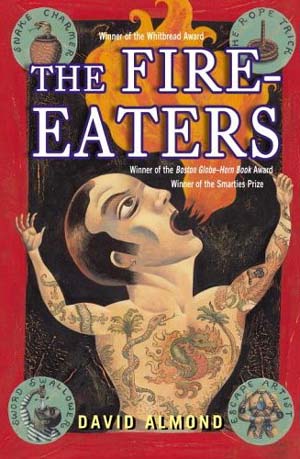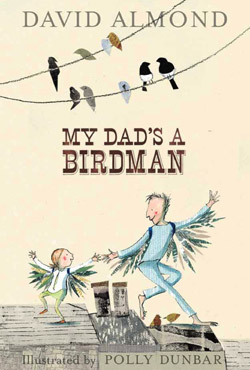Last week*, I ended by admitting that there is something frightening about David Almond's books, something powerful and dark and mysterious. It's this very quality, his ability to turn a world we accept without thinking into a stark and terrible truth simply by exposing it to the power of imagination, that I find so compelling in his work.
Okay, so what does that mean? Well, I think Almond's books fall into two types (if I can be so crass as to bluntly categorize one man's entire body of work), and Skellig, his first book and the one I discussed last time, falls into the first category, in which Almond explores what is frightening about the world around us, and how we triumph over that fear with imagination.
 Maybe I'm wrong about this, but if you look at books like The Fire Eaters (one of my personal favorites), My Dad's a Birdman, Skellig, and his latest, The Savage, you find a core conflict at work: individual kids struggling with threats--ominous, nebulous--threats and fears encroaching from the outside world. And their struggle is as much one of imagination as it is something concrete.
Maybe I'm wrong about this, but if you look at books like The Fire Eaters (one of my personal favorites), My Dad's a Birdman, Skellig, and his latest, The Savage, you find a core conflict at work: individual kids struggling with threats--ominous, nebulous--threats and fears encroaching from the outside world. And their struggle is as much one of imagination as it is something concrete.As imperfect a choice as it may be, I use that word "concrete" to avoid the word "real", because in a David Almond novel, questions about what is real and what is not are almost not worth asking--the mind is powerful enough to conjure both angels and demons, and sometimes, as with Skellig, it is unclear which is which.
All this is nebulous, so let me give an example. His chapter book, My Dad's a Birdman, is often overlooked because it is aimed at younger readers, however, in many ways, it's the best place to stare. What I'm talking about is quite clear at the outset. The main character, Lizzie, is motherless, and her father is nearly useless, pretending he's a birdman, requiring Lizzie to cajole him into eating, showering, shaving, etc. The book opens with a scene much like most schoolday mornings: a parent pushing, arguing, prodding their kid to get ready for school. Only here it is not the parent doing the prodding, but the child, and it is not a kid that resists getting ready and getting on with their day, but the father.
 I'm in the middle of reading this book to my 5 year old daughter, and I could tell from the beginning that she was riveted by it, caught somewhere between excitement and unease. Within its pages, the natural order of the world is upended: everythings is reversed--a child is responsible for an adult, and a parent acts out, playing pretend and ignoring the rules of what should be. My daughter finds it strange, funny, and disturbing all at the same time. She's hooked.
I'm in the middle of reading this book to my 5 year old daughter, and I could tell from the beginning that she was riveted by it, caught somewhere between excitement and unease. Within its pages, the natural order of the world is upended: everythings is reversed--a child is responsible for an adult, and a parent acts out, playing pretend and ignoring the rules of what should be. My daughter finds it strange, funny, and disturbing all at the same time. She's hooked.Imagination, then, both transforms and violates, through its ability to take off in flight (I think it's no coincidence that wings play a large role in many of David Almond's novels) and to threaten everything and everyone around. In The Fire Eaters, the book opens with Bobby Burns witnessing a homeless carny named McNulty swallow fire and pierce his flesh with knives. It's a great opening, and very David Almond: vivid and grotesque. But, while Bobby is disturbed by McNulty, there's something about the fire-eater that gets under his skin, that he absorbs and makes his own--which then opens the door for Bobby to confront some of the more personal demons (an oppressive new school, a growing distance from his best friend) that come up in the novel through his own defiant, sensational, and disturbing actions.
But there's another kind of David Almond novel, one in which the disturbing swirl of the darkest substance a young mind can conjure creates a world all its own, outside the influence of the orderly world of adults. And that, for me, is the best Almond has to offer--and I explore that more in my next David Almond blog (hopefully much less than a week away...)
*btw: sorry it's taken me so long to get this follow-up post on here--I've been waylaid by illness, but am feeling much better now.
(edited to add links)

No comments :
Post a Comment